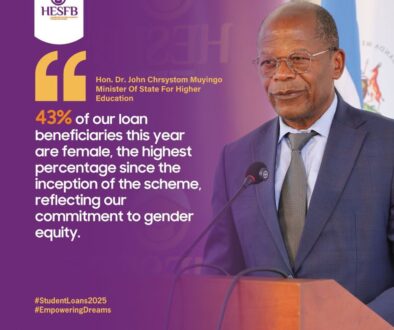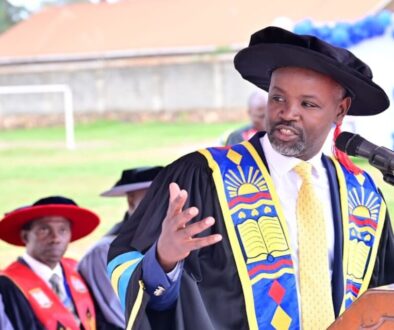Universities tipped on alternative financing

By Stephen Wandera Ouma
Higher institutions of learning have been advised to innovate alternative funding for higher education programs in Uganda. The call comes at a time when the Higher Education Students’ Financing Board on 6th July, 2023 announced that it will not be accepting any new applications for the study loan due to budgetary shortfalls.
According to Dr Joseph Muvawala, the Executive Director of the National Planning Authority (NPA), universities and other Higher institutions of learning relying on government funding and tuition is not sufficient to guarantee quality higher education.
“We are at cross roads of financing higher education, it is not getting the threshold it requires. The current financing model is not sustainable. Think of endowment fund to fund your programs,” he said.
An endowment fund is money set aside and invested to earn revenue to fund some type of charitable activity.
Public universities are funded by the government and also collect tuition from private student while private universities depend on tuition with a few leaners who finance by the Higher Education Students’ Financing Board.
“We propose that you start thinking of other ways like endowments. In America, endowments equate to the GDP of this country alone. We also think there’s something not going well with alumni of these universities. How many have ever contributed to Makerere University,” he added.
Dr Muvawala also challenged institutions of higher learning to look at how they acquire and utilize their resources. He said tuition is not the only financial way of sustaining higher education.
“I think one of the things we need to do as a country and as higher education, is that tuition is not one of the ways of sustaining institutions,” he further explained.
With such development and underfunding of NCHE, chances of producing high-quality graduates are at stake.
Speaking at a public lecture in Kampala, Dr Muvawala emphasized that underfunding is hampering the development of the education sector. The lecture was part of National Council for Higher Education (NCHE)’s 20th-anniversary celebrations. Moderated by Mr Robert Kabushenge, the former Managing Director, Vison Group, the lecture had Dr Ruth Biyinzika M Kasoslo, Project Director, Private Sector Foundation and Proff. Wasswa Balunywa, Principal, Makarere Business School as panellists. Others were Dr Florence Nkayiwa, Deputy Executive Secretary – Resource Mobilization and Management, RUFORM, Dr Muhumuza Fred, Development Economist and Mr Francis Muhumuza, Principal Economist, Ministry of Finance, Planning and Economic Development who represented Mr Ramathan Ggoobi, the Permanent Secretary.
Dr Muvawala further explained, “Due to lack of financing university produce half backed graduates.”
This was further reinforced by the Mary Prof. Okwakol the Executive Director, NCHE who called for more funding. She emphasized that the sector is not receiving the required investment to compete in developing the country.
She said they are worried that this could hinder the quality of education service delivery.
“The NDP III emphasizes strengthening of the NCHE through adequate funding and staffing to improve quality assurance in Universities and other institutions of higher learning.
She said, “higher education is undoubtedly underfunded in both public and private institutions.”
Okwakol said that the increase in demand for higher education is dictated by the upsurge in population.
She highlighted that underfunding is symptomized by the low enrolment estimated at 268,686 students in 2020/2021, resulting in a gross enrolment ratio of 5.9% which is much below the sub-Saharan average of 9.4%.
“NCHE is engaging you as key higher education experts and stakeholders to examine the importance of finance and investment as the fundamental enablers of the sub-sectors in Uganda and also provide a platform for reviewing, developing and implementing appropriate higher education financing,”
Dr Muvawala, decried the unit cost funding of a student at the university level that has affected institutions of higher learning.
Muvawala noted, “It’s cheaper to educate a university student compared to one at the primary or secondary level. These things are working together. You don’t get enough finances, we cut corners. We cut corners; we produce a graduate who is not good enough. Financing is the cause,” he said.
Dr Muvawala suggested Higher Education Students’ Financing Board mandate be broadened to investments in order to generate more money to fund higher education.
“Can Higher Education Students’ Financing Board be given more money and be allowed to invest in ventures like treasury bills and bonds. This will ensure that it has enough money to meet the increasing demand for higher education,” he said.
Francis Muhumuza however told the gathering Ministry of Finance, Planning and Economic Development has no money. He defended the budget cuts saying 40 percent of the budget has been allocated for payment of loans that were due.
Kabushenga queried Higher Education Students’ Financing Board capacity to manage the proposed investment fund.
“Does the Board have the capacity to effectively manage the Fund?” he said.
In response, Mr Michael Wanyama, the Executive Director, Higher Education Students’ Financing Board defended his board saying it has managed the students’ finance scheme successfully with a collection rate of 28 percent in the first year.
“We have just started collecting loans given to students. Last year we projected to collect Shs1.5 billion, we got Shs1.2 billion. By 2029/ 2030, projected collection is Shs8 billion. We have invested Shs1.9 billion on fixed deposit account. We are moving in the right direction.”
He also advised the government university sponsorship be changed.
“The scholarship follows the students to the university of their choice but not the students to direct to a certain university. The challenge is over whelming demand. Only 4,000 students get loans out of 40,000 applicants.”
Ms Sarah Achemo, the Students’, NCHE raised concern of many student who are likely to miss out on higher education due to the Higher Education Students’ Financing Board budget cut.
Nakayiwa decried the mismatch of graduate produced onto the labour market and demand. She recommended bench marking Europe and Canada, with some of the world’s best universities.
Dr Biyinzika blamed the skills training and labour demand discrepancy on poor carrier guidance that needs to be streamlined.
Prof Waswa Balunywa, Principal, Makerere University Business School (Mubs) called for reforms in the education sector.
“Combine primary and secondary may be primary 1 to primary 10 and ensure every student attains higher education.”


